‘We will safeguard our freedom’
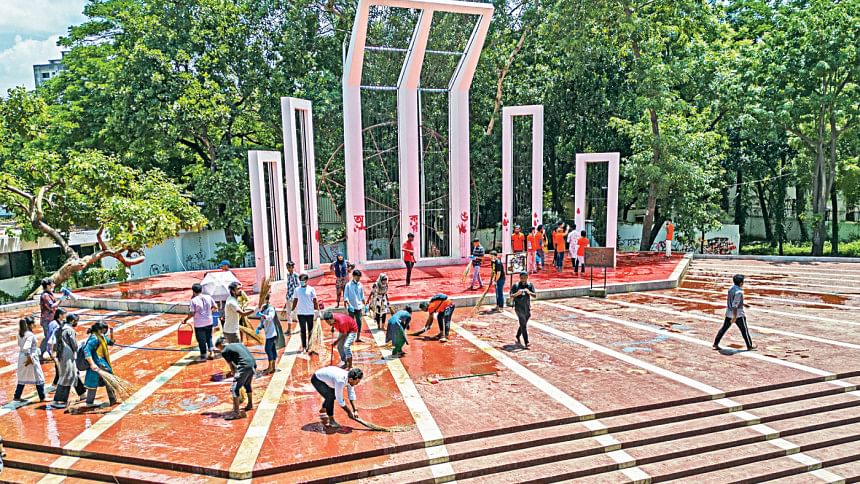
"Shadhinata orjoner cheye rokkha kora kathin"
This is a saying in Bangla that students learn in textbooks at a very early age, which means "Freedom is harder to protect than to earn".
But they didn't memorise the verse just for the sake of it, thousands of Bangladeshi students across the country are now living by it and passing sleepless nights to safeguard the freedom.
In July, Young people like Abu Sayed, Mugdho, Priyo and others were killed by law enforcers and Awami League activists when they took to the streets for a discrimination free Bangladesh.
But students did not back down.
On August 3, they delivered a clear message to Sheikh Hasina: "Quit now".
Revolution was in the air as people from all walks of life -- guardians with children, rickshaw pullers, workers, day labourers, office-goers, and others -- joined in masses, rallying behind the youth waving the national flag.
On August 4, the streets of Dhaka seemed to converge on Shahbagh, the epicentre of the uprising, as the area turned into a sea of people. By evening, reports of injuries and deaths began to surface.
At one point, bodies were being piled up in front of the Central Shaheed Minar.
Dozens were dying, but in the midst of it all, the students issued a call: "March towards Dhaka" on August 5.
Students barely slept on the night of August 4. They braced for the worst, but they were not afraid.
Defying police, Awami League activists, and the BGB, hundreds of thousands began marching toward Dhaka on August 5.
There were reports of police firing in the morning, but then the winds began to change. Suddenly, law enforcers stepped aside, and the army allowed protesters to march toward Gono Bhaban.
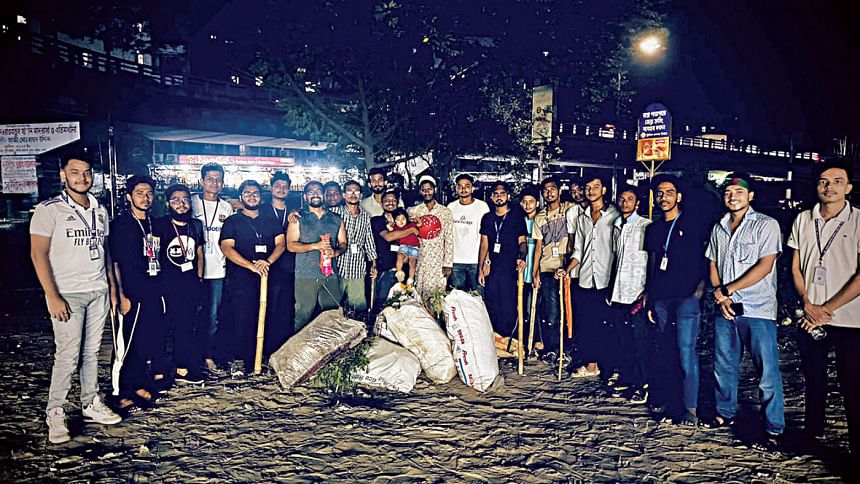
By that time, people sensed freedom -- they knew something big was coming. They cheered, they marched on, singing and dancing in the streets.
And in the afternoon, the announcement came: "Sheikh Hasina has resigned and fled to India".
The streets, once filled with fear, were now alive with a sense of freedom.
As the day wore on, the atmosphere shifted from one of defiance to one of celebration.
Fear was replaced by joy, and the streets that had once echoed with cries for justice now reverberated with songs of freedom.
People danced, sang, and embraced one another. Strangers became friends, and the city was united in a way it had never been before. Sweets were distributed, and tears of happiness flowed as the young generation celebrated their newfound sense of empowerment. Initially, it was a day of pure, unadulterated joy -- a day when hope triumphed over despair.
But as the celebrations continued, the reality of the situation began to set in.
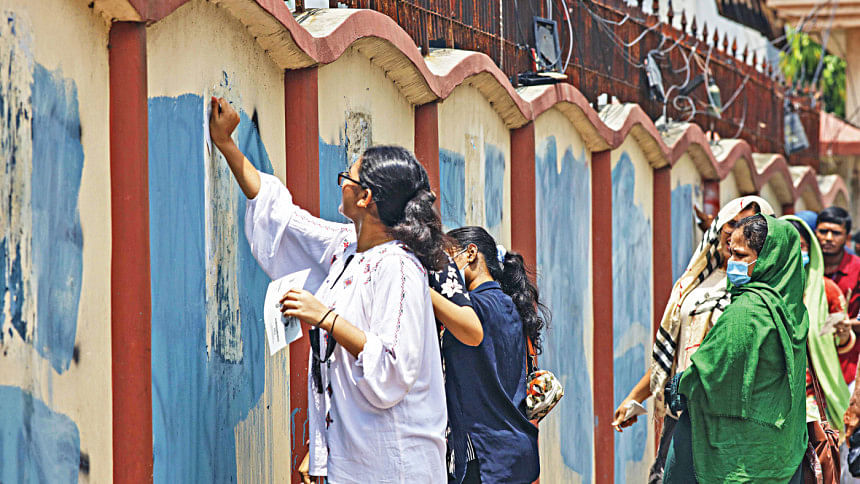
In the beginning, the scenes of people storming the Gono Bhaban seemed to be entertaining. Then news of vandalising temples, houses and establishments started coming in.
The Bangabandhu Memorial Museum on Dhanmondi 32 was burnt to ashes. Cultural heritages came under attack. State infrastructures were vandalised and looted. Police stations were being attacked. People, associated with AL and Hasina, and law enforcers, were being beaten to death.
Police left their post, the country was essentially without a government for 72 hours, and the streets descended into chaos.
The students realised they might have won a battle, but the war for lasting change had only just begun.
There was a renewed sense of purpose among the youth. They had tasted freedom, and they were determined to protect it at all costs.
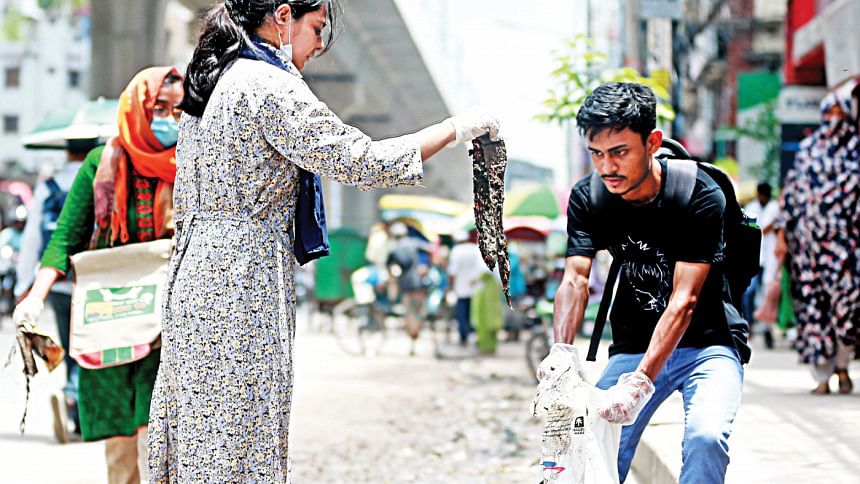
PROTECTING TEMPLES
Al Mahmud Taha, a recent graduate of Dhaka University, was celebrating when he first heard news of temples being vandalised.
Wasting no time, he mobilised a group of peers and headed for Dhakeshwari temple.
With a group of 25, which included Islamic scholars and imams of nearby mosques, they guarded the place all night.
Similarly, the youth from across the country tried to protect temples near them.
Tasneem Abedin Razu, an activist in the anti-government movement from Mirpur, woke up on August 6 with a sense of urgency. His first action was to visit nearby mosques to mobilise imams, muezzins, and Islamic scholars. He then gathered the activists he knew and formed a team dedicated to safeguarding the temples in Mirpur. Additionally, Razu visited nearby minority homes, providing residents with the contact numbers of young volunteers who could offer assistance.
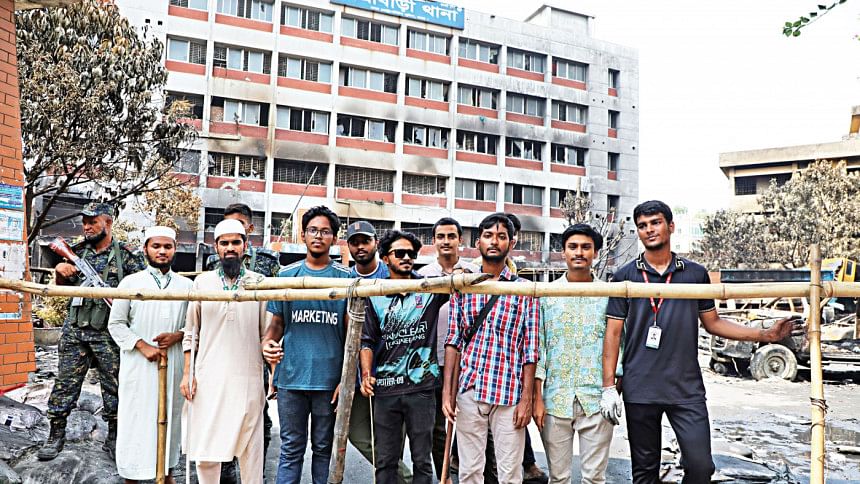
Similar scenes of students guarding places of worship were seen in front of Ramna Kali Temple and ISKCON Swamibag Temple in Dhaka.
In Chattogram, students, armed with sticks, were seen guarding the Nandirhaat and Fatehabad temples.
In Cumilla, Muslim clerics and students were seen guarding the temples all night.
RESTORING ORDER, MANAGING TRAFFIC
On August 6, approximately 200 students took on security duties at various police stations, churches, and temples in Mirpur.
"We've been stationed at Mirpur Police Station and all churches and temples in Mirpur since 9:00am," said a student.
The police station had been set on fire by a mob the previous night.
In the aftermath, students found an abandoned firearm, damaged firearms, ammunition, a grenade, and a walkie-talkie, and have requested that the army take custody of these items.
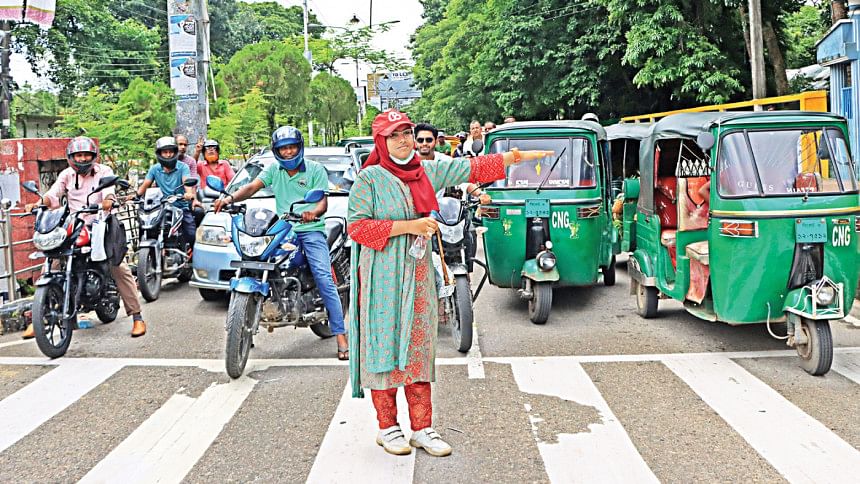
Similar scenes were seen in front of Jatrabari Police Station and beyond.
The same day, students returned 40 firearms taken away by miscreants from the National Parliament on August 5.
They handed over the firearms to the security team at the parliament.
Students also cleaned the premises of the Jatiya Sangsad Bhaban, which was ransacked by a mob on Monday following Hasina's resignation.
Several photos of students voluntarily cleaning the iconic building were doing rounds on social media. They were seen sweeping the ground and cleaning open spaces of the important structure.
A number of volunteers were also seen collecting valuables that had been looted from Gono Bhaban and the parliament. Some people, who looted the valuables, were seen handing over those to the volunteers, who then returned them to the authorities.
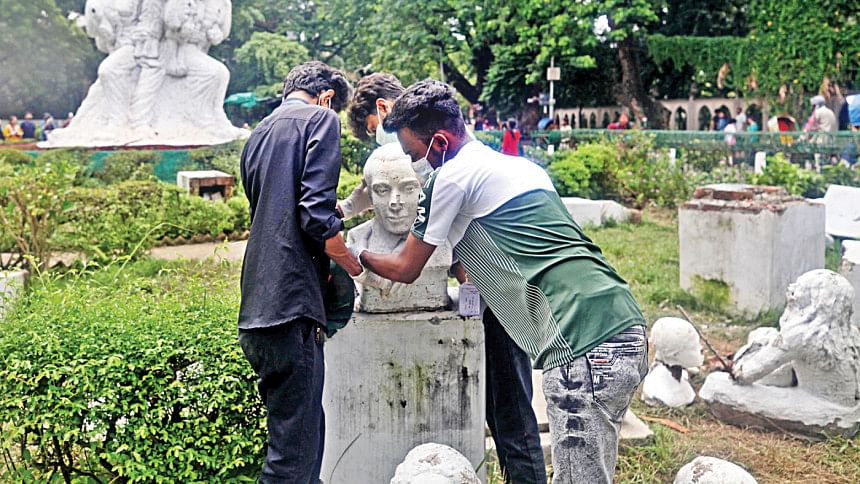
Students also took on the role of traffic management, taking positions at every key intersection in the capital and beyond.
They created separate lanes for different types of vehicles, bringing back the memories of the 2018 road safety movement.
They stopped bikers for not wearing helmets, intercepted rickshaws for plying the wrong direction and urged pedestrians to use footbridges.
Ali Wasif, a college student, said, "This is our country. Our brothers gave lives for this country. We won't let this country descend into chaos as long as we have life in our body." He was managing traffic at Panthapath intersection. "We will safeguard our hard-earned freedom."
Commuters were gladly following their directions. Nahidul Islam, a private job holder, said, "It's heartwarming that these young people took the duty into their hands in the absence of traffic personnel."
ROBBERY WATCHOUT
Amid rising concerns of robberies in various Dhaka neighborhoods, including Mirpur, Mohammadpur, Uttara, and Dhanmondi, residents, mostly the youth, have been staying up all night to protect their communities. With police essentially absent, locals are using mosque loudspeakers and social media networks to warn of potential attacks.
"Last night around 2:00am, we heard an announcement from the mosques that robbers had entered the neighbourhood. We then went out onto the streets with sticks," said Shaheen, a resident of East Shewrapara.
Residents in Uttara and Mohammadpur have also experienced robberies, with locals responding quickly by patrolling the streets.
Many school and college goers were seen playing football and cricket the whole night as a means to guard the streets.
A resident of Mohammadpur mentioned that robbers entered the area from different directions around 12:30am early yesterday, but people came out of their homes with sticks and chased away the robbers.
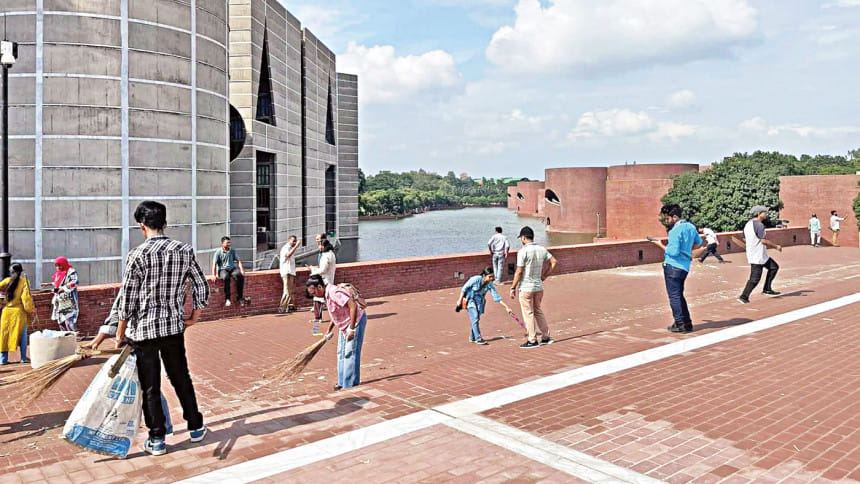
Residents in Uttara said robberies took place late at night at Sector 7. Afterwards, the mosques made announcements asking everyone to stay alert in Sectors 11, 12, and 14.
Tahmid Islam, a resident of Uttara, said he and many others patrolled the area the whole night.
Meanwhile in Dhanmondi, Kalbagan and Kathalbagan, locals were seen patrolling the area.
STAY-AWAY EXTORTIONISTS
Just a day after Hasina's resignation, a group claiming to be activists of a party reportedly tried to extort money from traders at Meradia Bazar in Rampura.
According to traders, Ideal School and College students, who had been patrolling the area, quickly intervened and chased the extortionists away.
The students provided their contact numbers to the traders, assuring them of support if any further trouble arose.
Similarly, students launched a Facebook group called "Chadabaji Nirodhon Response Team", aimed at forming quick-response teams to counter extortionists across Dhaka and beyond. What started with just 100 members quickly ballooned to 87,000 within two days.
Meanwhile, the students of Dhaka University were also guarding different dormitories of the campus to make sure outsiders with different party affiliations do not take over the dormitories and bring back the culture of repression on campuses.
Pavel, a recent graduate, said he and his juniors have patrolled DU streets for the last few nights to ensure no one can further vandalise sculptures and engage in mugging or extortions.
"Enough is enough, we want a safe campus, free from student politics," he told this correspondent.


 For all latest news, follow The Daily Star's Google News channel.
For all latest news, follow The Daily Star's Google News channel. 



Comments